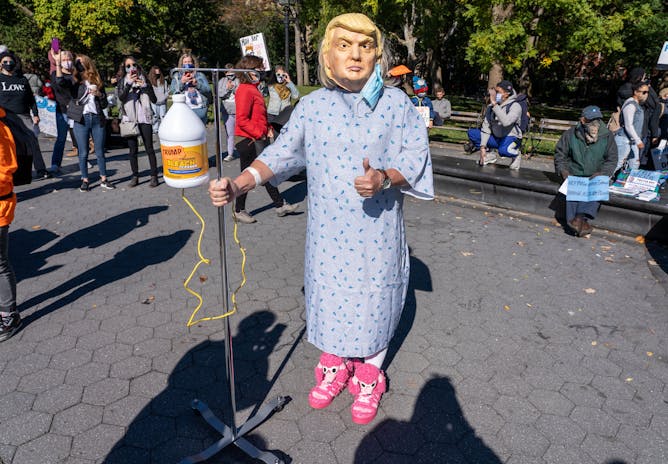|
|
|
|
Top headlines
Lead story
Whether it’s their verbal gaffes, scores of scandals or their hair (or lack thereof), Joe Biden and Donald Trump have been ridiculed every which way.
So how will comedians handle what’s looking like another matchup between two creaky, ornery candidates who have spent decades in the spotlight?
Sophia McClennen, author of the new book “Trump Was a Joke: How Satire Made Sense of a President Who Didn’t,” points to research showing how comedy can invigorate an exhausted electorate, making them more likely to participate in the political process.
But she notes that not all political comedy is equal.
“Jokes that focus on physical traits – fat bellies, bald heads, bumbling speech – can exhaust voters,” she writes. On the other hand, satire, which usually centers on faulty logic and abuses of power, “has been shown to compel citizens to volunteer, donate to campaigns and vote.”
With two candidates who serve up opportunities for mockery on a silver platter, comedians will have to avoid the low-hanging fruit as the 2024 cycle kicks into gear.
[Sign up here to our topic-specific weekly emails.]
|

|
Nick Lehr
Arts + Culture Editor
|
|

Former President Donald Trump’s many missteps made him an easy target for amateur jokesters.
Ron Adar/SOPA Images/LightRocket via Getty Images
Sophia A. McClennen, Penn State
While derision and mockery permeate airwaves and social media feeds, satire holds the key to creating a more informed, engaged electorate.
|
Environment + Energy
|
-
Robert Glennon, University of Arizona
Southwest states have bought time with an agreement between California, Arizona and Nevada to cut Colorado River water use by about 14%. Now comes the hard part.
-
Kelsey Ellis, University of Tennessee; Nicholas Grondin, University of Tennessee
El Niño years put Hawaii and the Mexican Riviera on alert for destructive tropical storms and hurricanes.
-
Jeff Basara, University of Oklahoma; Jordan Christian, University of Oklahoma
If greenhouse gas emissions continue at a high rate, breadbaskets of Europe and North America will see a 50% chance of a flash drought each year by the end of this century.
-
Albert C. Lin, University of California, Davis
In Sackett v. EPA, a suit filed by two homeowners who filled in wetlands on their property, the Supreme Court has drastically narrowed the definition of which wetlands qualify for federal protection.
|
|
Arts + Culture
|
-
John M Sloop, Vanderbilt University
Anti-racist programs and fines have failed to end racism in European soccer. Part of the problem is that Black players have little representation higher up the sport’s hierarchy.
|
|
Science + Technology
|
-
Ana L. Santos, Rice University; Jacob Beckham, Rice University; James Tour, Rice University
Fungal infections can be among the hardest to treat, and since the pandemic began they’ve become only more common. To prevent future antifungal resistance, scientists have developed tiny molecular drills.
|
|
Health + Medicine
|
-
Anelyssa D'Abreu, University of Virginia
REM sleep behavior disorder is characterized by acting out dreams, which may include shouting, kicking and punching during sleep.
|
|
Politics + Society
|
-
Jeff Inglis, The Conversation
The founder of a violent anti-government group has been sent to prison for seditious conspiracy. Experts explain what that means.
-
Michael A. Allen, Boise State University; Carla Martinez Machain, University at Buffalo; Michael E. Flynn, Kansas State University
Papua New Guinea’s relative proximity to both China and Australia could give the US a military advantage in the Pacific region.
|
|
Podcast 🎙️
|
-
Mend Mariwany; Nehal El-Hadi, The Conversation
The conditions placed on countries borrowing money from the International Monetary Fund have further disadvantaged these countries economically.
|
|
From our international editions
|
|
|
|
|
|
|
|---|
-
More of The ConversationLike this newsletter? You might be interested in our weekly and biweekly emails: Trying out new social media? Follow us: -
About The ConversationWe're a nonprofit news organization dedicated to helping academic experts share ideas with the public. We can give away our articles thanks to the help of foundations, universities and readers like you. |
|
| |
| |
| |
| |
|
|
|
|
|
|
|